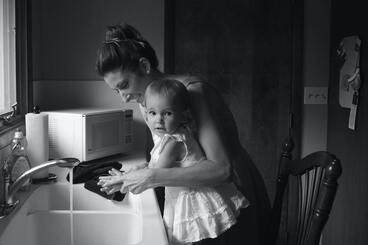January: giving thanks

The phrase “give thanks” comes up, by at least one estimate, 102 times in the Bible. Sometimes it’s connected with getting along in community, sometimes with lament, sometimes in a list of good habits. We can assume that giving thanks is a pretty important part of a life of faith! This month’s scripture is part of the final blessing of instructions in a letter from Paul to the church in Thessalonica. He encourages them to give thanks in all things, not just when life is going their way. Giving thanks is a habit. A life of gratitude is a way of being, a way that permeates our spirituality and our outlook on the world. And we’re never too young to begin!
Read It
I Thessalonians 5:16-18 Rejoice always, pray continually, give thanks in all circumstances; for this is God's will for you in Christ Jesus.
Pray It
God, we thank you. Thank you for this day you created, and thank you for sticking with us when things go our way and when they don’t. In Jesus’ name, Amen.
God, we thank you. Thank you for this day you created, and thank you for sticking with us when things go our way and when they don’t. In Jesus’ name, Amen.

Do It - Remember "little habit, big impact!"
Sing or say a short prayer of thanks as you play and do tasks.
Song: Here’s a video of a family singing a common prayer song called “Hands, hands, hands.”
Take the first phrase of this and substitute whatever words you like. For example:
-As you bathe your infant, sing, “Soap, soap, soap, thank you God for soap.”
-As you play with blocks with your toddler, sing, “Blocks, blocks blocks, thank you God for blocks.”
-As you walk with your preschooler and feel a sudden ray of sunshine, sing, “Sun, sun, sun, thank you God for sun.”
-Spoken prayer: Not comfortable singing? Try just saying that short prayer instead. “Thank you God for soap!”
It is amazing how quickly this can become part of who you are and who your child is. And while you may feel silly and have to think about the prayer for the first few weeks, it will get more comfortable and take less brain space over time. Don’t be surprised if, before long, your little one spontaneously bursts out in these thanks to God. Know that you are helping your child establish the habit and attitude of thanks to God.
Sing or say a short prayer of thanks as you play and do tasks.
Song: Here’s a video of a family singing a common prayer song called “Hands, hands, hands.”
Take the first phrase of this and substitute whatever words you like. For example:
-As you bathe your infant, sing, “Soap, soap, soap, thank you God for soap.”
-As you play with blocks with your toddler, sing, “Blocks, blocks blocks, thank you God for blocks.”
-As you walk with your preschooler and feel a sudden ray of sunshine, sing, “Sun, sun, sun, thank you God for sun.”
-Spoken prayer: Not comfortable singing? Try just saying that short prayer instead. “Thank you God for soap!”
It is amazing how quickly this can become part of who you are and who your child is. And while you may feel silly and have to think about the prayer for the first few weeks, it will get more comfortable and take less brain space over time. Don’t be surprised if, before long, your little one spontaneously bursts out in these thanks to God. Know that you are helping your child establish the habit and attitude of thanks to God.
Explore it: A Note from Tami
Parents and caregivers are most effective when we ourselves live what we try to teach our children. These articles emphasize the value and benefits of being thankful and provide valuable insights into how one promotes a deeper quality of gratitude in our children. Infants and toddlers do not yet understand the complexities of gratitude. However, when they routinely experience our continual attitude and habits of thankfulness, they begin establishing their own thankful thought patterns and behaviors.
* 7 Scientifically Proven Benefits of Gratitude That Will Motivate You to Give Thanks Year-Round
* What Parents Neglect to Teach About Gratitude
Parents and caregivers are most effective when we ourselves live what we try to teach our children. These articles emphasize the value and benefits of being thankful and provide valuable insights into how one promotes a deeper quality of gratitude in our children. Infants and toddlers do not yet understand the complexities of gratitude. However, when they routinely experience our continual attitude and habits of thankfulness, they begin establishing their own thankful thought patterns and behaviors.
* 7 Scientifically Proven Benefits of Gratitude That Will Motivate You to Give Thanks Year-Round
* What Parents Neglect to Teach About Gratitude
